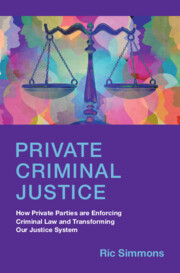 Private Criminal Justice
Private Criminal Justice Published online by Cambridge University Press: 21 September 2023
This chapter analyzes private criminal settlements through the lens of blackmail law. Private criminal settlements meet the definition of blackmail in every state, but there are reasons to think that they should be made legal. First, the theoretical justification for the crime of blackmail is relatively weak, and it is even weaker in the case of private criminal settlements. The chapter concludes by arguing that there are only two dangers that may arise from allowing private criminal settlements: first, that the blackmailer will become an accomplice after the fact and, second, that the blackmailer may be violating a moral or statutory duty to report the crime. However, these dangers could be alleviated by (1) increasing the punishments (and thus the deterrence level) for actively concealing criminal activity and (2) criminalizing any attempt to blackmail using incriminating information if the blackmailer has a statutory duty to report the crime in question.
To save this book to your Kindle, first ensure no-reply@cambridge.org is added to your Approved Personal Document E-mail List under your Personal Document Settings on the Manage Your Content and Devices page of your Amazon account. Then enter the ‘name’ part of your Kindle email address below. Find out more about saving to your Kindle.
Note you can select to save to either the @free.kindle.com or @kindle.com variations. ‘@free.kindle.com’ emails are free but can only be saved to your device when it is connected to wi-fi. ‘@kindle.com’ emails can be delivered even when you are not connected to wi-fi, but note that service fees apply.
Find out more about the Kindle Personal Document Service.
To save content items to your account, please confirm that you agree to abide by our usage policies. If this is the first time you use this feature, you will be asked to authorise Cambridge Core to connect with your account. Find out more about saving content to Dropbox.
To save content items to your account, please confirm that you agree to abide by our usage policies. If this is the first time you use this feature, you will be asked to authorise Cambridge Core to connect with your account. Find out more about saving content to Google Drive.